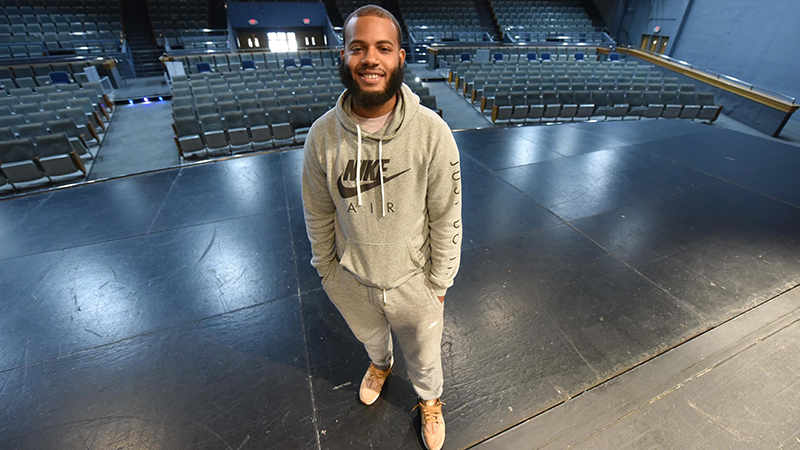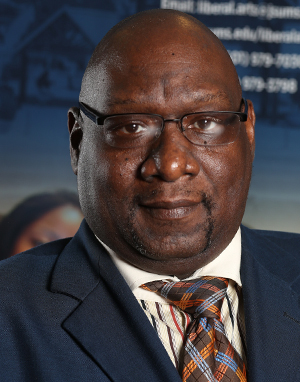VIDEOGRAPHER: SARAH WARNOCK/Clarion Ledger
“I don’t know how to tell you this, but your brother was shot.”
Michael Taylor’s heartbeat quickened. He was having difficulty breathing. The words the high school sophomore wanted to speak refused to come out.
In the 10 minutes since his assistant principal at Urban Prep Academies at Englewood Campus in Chicago pulled him from class, Taylor’s life was changing drastically.
“It was Dec. 10, 2013,” the 20-year-old Chicago native recalled.
Arriving at the hospital with his father, they were met by family and his brother’s friends. “His friends were the ones trying to keep him alive. They had blood on their clothes. Everything was hitting me so fast. It felt like a movie. I felt like I was watching my own movie,” he said.
His parents were trying to calm everyone and fill the atmosphere with optimism. It was working. The tears were subsiding, and some of the tension had eased.

Sarah Warnock/Clarion Ledger
Student Michael Taylor is determined to change the negative stereotypes and narratives surrounding black men.
Until the surgeon arrived with an update.
“He said, ‘I’m afraid I have some bad news,'” Taylor remembers. “My heart started beating fast again. I was trying so hard to believe that he said something else.”
But it wasn’t something else. His older brother, Deonte Womack, who had turned 21 just five days earlier, had died. He’d been shot in the head, neck and shoulder during a robbery attempt. The assailant, Tyree Brannon, was later sentenced to 35 years for murder and 15 years for the attempted murder of Womack’s friend.
“We were so close,” Taylor said of his brother. “We slept in bunk beds. He always had my back. I could talk to him about anything.
“Now, it’s bittersweet. I miss my brother, but at the same time I know he’s proud of me. I’m doing something positive, and I’m trying to get my family out of that environment.”
He wants to help other youth
In 2016, the Urban Prep graduate enrolled at Jackson State University as a theater major. Although he loves his hometown, Taylor, an aspiring actor, said he needed to escape the place that stole his “ace.” Plus, his high school teachers, many of whom are HBCU graduates of historically black colleges and universities, instilled in him a belief in the power of higher education.
Mark Henderson, his theater and speech professor, said Taylor struggled his first semester, still coping with the loss of his brother and moving to a new state.

Jackson State University
Mark Henderson
“Mikey, to me, represents the epitome of what my philosophy is as an educator: Meet the students where they are and take them to where their destiny waits for them. His first semester was tragic,” Henderson said. “I sat down with him and told him that as it relates to his major and career goals, he has to decide whether he’s going to be a participator or a spectator. I told him I would not hold his hand but would give him as much as he gave me. I then started to see a change in him for the better.”
Taylor’s grades improved, and he began to excel in his major. He has performed in numerous plays and acting competitions while collecting awards and accolades along the way.
“Mikey has an innate talent when it comes to acting. He can get a script and on the spot has an intuition about how to interpret the character. This is a process that usually takes a director a while to develop in an actor,” Henderson said. “Mikey finds refuge in the theater. There are times when I walk in the auditorium, and he’s on the stage sleeping or just hanging around. In a day and time when there are so many negative voices and so many regrettable choices, I am happy to offer students like Mikey a place where they can explore all of the complexities of life in a space that gives them release.”
[Related: Dixie Pipeline: Guns Bought in Mississippi Often Reach Chicago Streets]
[Related: Scarred By Gang Violence, Greenwood Residents Rally to Rescue City’s Youth]
Like his mentor, Taylor wants to inspire youth. Last year, he hosted his first back-to-school giveaway in his hometown with the hope of deterring kids from violence and gang affiliations. There he distributed 50 backpacks filled with school supplies to students in need.
“This was on the day that we celebrated my brother’s life. We have a picnic for him every summer. This time I wanted to do something in remembrance of him because he was always a giver,” he said.
Taylor said his long-term goal is to start a foundation that provides the necessary community resources to prevent adolescents from heading down a treacherous path, perhaps like the one taken by his brother’s killer. Seventeen years old at the time of the shooting, Brannon has juvenile convictions for robbery, possession of a controlled substance, battery and aggravated unlawful use of a weapon. He was 12 when he was arrested for the first time and found guilty of two counts of robbery.
Exactly why Brannon gravitated toward criminality is speculative. Growing up in an environment where violence and death is a daily occurrence could be a factor. Children can become desensitized and it may be hard for them to reconcile feelings of loss and rage.
Taylor admits that after his brother died, he developed anger issues and he has to work hard to manage that emotion.
Regardless of the reasons, Taylor is also determined to change the negative stereotypes and narratives surrounding black men. Children are best reached through school, television and sports, he says. And more people need to return to their roots and offer light to those in dire circumstances.
“Kids need to see more people who look like them being successful and giving back. When I get older, I want people to look at me like I really tried to make a difference, like I really tried to change the city of Chicago and do something positive,” he said.
This story was produced in conjunction with the Juvenile Justice Information Exchange and published with the Mississippi Center for Investigative Reporting and the Clarion Ledger. It is part of the JJIE’s project on targeting gun violence. Support is provided by The Kendeda Fund. The JJIE is solely responsible for the content and maintains editorial independence.





























